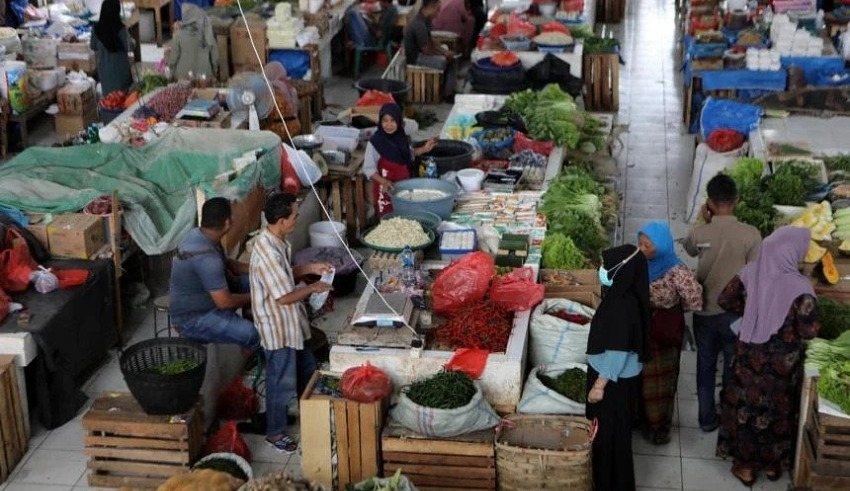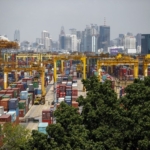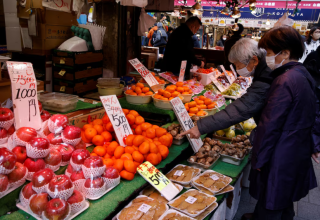
The annual rate of inflation in Indonesia maintained its ascent in July, reaching 4.94 percent year-on-year for the month.
Since October 2015, this month’s result marks the country’s highest inflation rate ever recorded. During that time, it stood at 6.25 percent.
According to Mr. Margo Yuwono, chief of the Indonesian statistics office, this occurs at a time when food and energy costs are skyrocketing around the world, as well as when domestic crop failures are occurring.
Mr. Yuwono stated on August 1 when he announced the most recent inflation rate that “global commodity prices, as well as some situations that occurred domestically such as rainfall and several government policies related to energy policy, have affected our inflation in July 2022.” Mr. Yuwono made these remarks when he announced the most recent inflation rate. Rainfall was one of the domestic situations that had an impact.
He pointed out that the significant contributions to growing inflation include increases in the prices of chilies and shallots as a result of crop failures brought on by recent heavy rainfall. He said this was one of the primary reasons for the rise in inflation.
According to Mr. Yuwono, one of the factors that contributed to the rise in inflation was the increase in the cost of domestic fuel and travel.
People on the ground have said that they are beginning to feel the strain. Because they have so few other choices, many food vendors have no choice except to hike their prices. Because chillies and shallots, two of the most important components of the sauce, are selling for a higher price presently, some people have chosen to use less sambal in their cooking for the time being.
The annualized rate of inflation in Indonesia was 2.18 percent in January. It had reached 3.47 percent by the month of April.
It reached a modest high of 3.55 percent in May before continuing its ascent in June, when it reached 4.35 percent.
The numbers for both June and July are higher than the goal range for the inflation rate set by the central bank, which is between 2% and 4%.
According to analysts who were questioned by CNA, the present inflation rate is the result of a number of factors that have accumulated over the course of the past few months.
A look into the future reveals that they anticipate a further acceleration in the rate of inflation.
According to Mr. Mohammad Faisal, the executive director of the research tank Center of Reform on Economics (CORE) Indonesia, who spoke with CNA, the increased inflation rate was precipitated by an overall low supply of commodities in the face of rising demand.
Research topics at CORE Indonesia focus on the country’s economy, industries, and commerce as well as regional development and public policy.
He added that as a result of the current global scenario, the supply chains for a number of different commodities have become disorganized. On the domestic front, there were production issues, such as failed crop harvests of chilies and shallots, both of which are perishable and seasonal.
In addition, there is a strong demand across the board due to the fact that COVID-19 limits have been loosened up this year, which has led to increased mobility.
If there is a high level of mobility among the population, then there will be a high level of demand for a variety of goods and services.
According to Mr. Faisal, “In the end, this will also lead to a rise in the prices of items.”
The head economist at the lending institution Bank Central Asia (BCA), Mr. David Sumual, shares a similar point of view.
We can see that people’s mobility is beginning to improve, and we can also see that credit growth is beginning to accelerate. As a direct consequence of this, underlying inflation is currently on the rise.
The core inflation rate for Indonesia was 2.86 percent year-on-year in the previous month. This measure of inflation does not include prices that are variable or seasonal, such as those for food. In June, it was 2.63 percent already.
Related Posts
Regarding the situation as a whole, Mr. Faisal of CORE Indonesia is of the opinion that supply issues are more significant contributing elements than the high demand. This is especially evident when one considers the inflation caused by imported goods.
When domestic production costs rise as a direct result of increases in the prices of imported fuels and materials, this phenomenon is known as imported inflation. Because of this, the costs of things that are produced domestically end up being greater.
A decline in the value of the currency’s exchange rate may also cause imported inflation.
According to Mr. Faisal, this has been an issue since the end of the previous year. He used the example of how increases in the costs of cooking oil domestically were triggered by higher palm oil prices globally as an illustration of this problem.
According to Mr. Faisal, “Supply problems have been happening since the end of the previous year such as problems with cooking oil, wheat, and non-subsidised gasoline.”
“Each of these components was nonexistent in the span of the most recent seven years. This is the reason why the inflation rate is so high right now,” he went on to say.
According to economist Bhima Yudhistira, who is headquartered in Jakarta, local producers have no alternative but to raise their prices in response to increased prices of imported products. This is because they have no competitive advantage.
Imported inflation is also a product of weak currency exchange, according to the executive director of the think tank Center for Economic and Law Studies (CELIOS).
The falling value of the rupiah has led to increased prices for imported goods.
In July, the value of the rupiah was measured against the US Dollar and it fell below the 15,000 threshold for the first time in two years.
For the past two weeks, it has been fluctuating about 14,800 US Dollars against the currency, but on Friday it reached 15,000 once more (Aug 5).
Even if the government provides subsidies, the high cost of imported food and energy is having an effect on Indonesia, according to Professor Sri Adiningsih of Gadjah Mada University in Yogyakarta.
“At first, the effect was not felt, despite the fact that other nations were already reporting inflation rates of 8 or 9 percent…”
The professor whose area of expertise is international and monetary economics stated, “However, the government cannot safeguard everything.”
The federal government offers financial assistance in a wide variety of fields, including fuel, electricity, and even rice.
The subsidies are designed to keep costs at an acceptable level, particularly for the people with lower incomes who make up a significant portion of the country’s total population of 270 million people.
According to Prof. Adiningsih, when prices on the worldwide market went up, the prices of goods in Indonesia likewise went up, regardless of whether or not the commodities are subsidized.
She mentioned, for instance, that the price of a barrel of oil on the international market increased to as much as US$120 recently.
As a direct consequence of this, the government has raised the price of premium grades of oil and gas, which are not eligible for subsidies. These higher grades of fuel are typically utilized by consumers who fall into the middle-income and upper-income brackets.
In July, the federal government also raised the prices of energy for enterprises and families that have installed electrical circuits with an operational capacity of 3,500 volt-amperes or more. Circuits with lower voltage are frequently utilized in homes with lower income levels.
Prof. Adiningsih made the observation that as a result, everything is affected, and the pace of inflation in Indonesia rises.
“Most notably due to the fact that the rupiah has been devalued. Therefore, this has an effect on the prices of things that are imported.
The war in Ukraine, according to analysts who were questioned by CNA, has unquestionably been a contributing factor in the archipelago’s soaring inflation rate.
Mr. Faisal, a representative from CORE Indonesia, noted that the war has contributed to an increase in the price of oil around the world by disrupting supply networks.
Additionally, Russia is a source of the fertilizer that Indonesia imports. Additionally, the supply chain has been disrupted as a result of the war. Because of this, the costs of a variety of different food goods in the Southeast Asian country have increased.
Mr. Faisal remarked that as a result, “the complexity of food inflation has increased.”
Mr. Yudhistira, who works at CELIOS, stated that an increase in the inflation rate is likely given the current circumstances. Given that the government has a limited budget to continue subsidizing commodities in the face of growing prices, he anticipates that it will rise to an amount as high as 6.5%.
Additionally, Professor Adiningsih is of the opinion that the rate of inflation will continue to rise.
She predicted that it would continue to rise, but that the rate of growth would be proportional to the amount of subsidies provided by the government.
On Friday of last week, Indonesia announced that its gross domestic product (GDP) for the second quarter was up 5.44 percent from the same period a year earlier, the fastest growth rate in the past twelve months.
According to Mr. Yudhistira, Indonesia has benefited from a boom in the commodities market, which has contributed to the rise of the country’s GDP. Indonesia is a major exporter of mining commodities such as coal.
The majority of the COVID-19 restrictions were lifted during the second quarter, which corresponded with the Idul Fitri celebrations that took place in May.
He made the observation that Indonesia’s Gini ratio, which is a measurement of how income is distributed across the population, is still quite high.
According to what he shared with CNA, “this means that the bottom 40 percent of customers cannot keep up with the top 20 percent, which means recovery could remain gradual.”
In this sense, Mr. Yudhistira emphasized the importance of not dismissing the high inflation rate as inconsequential.
He stated, “Given the expansion in GDP, we are fortunate; yet, we must proceed with caution.”





























